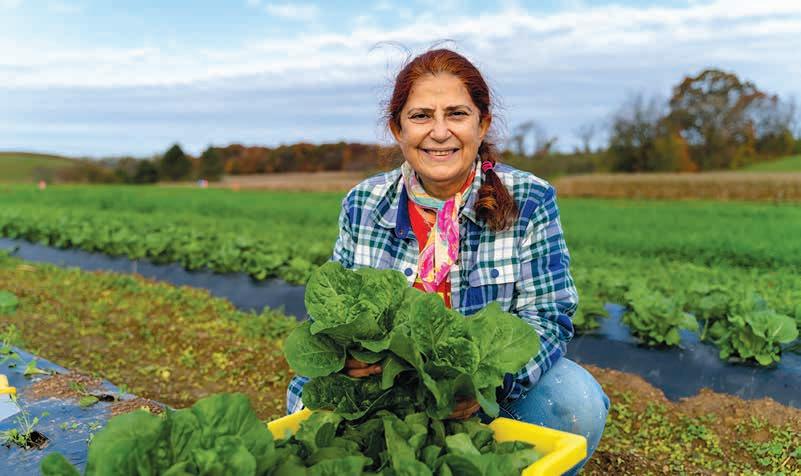
3 minute read
THE MICROBIOME CONNECTION HOW SOIL AND HUMAN HEALTH ARE RELATED
by Kelcie Ottoes
The human gut microbiome, which is critical to fighting off disease, and soil microbiome, which enables plant growth, are vitally important to maintaining all life on our planet. These two communities of microorganisms are indirectly connected in important ways, and researchers are trying to find out more about their interplay.
Advertisement
Human Microbiome
The human gut microbiome consists of trillions of microorganisms of different species. These microbes help to digest food, synthesize vitamins and other important compounds, regulate our immune system and even influence behavior and mood.
The gut microbiome includes both helpful and potentially harmful microbiota that coexist peacefully in a healthy person. But certain diets, or the use of antibiotics or other bacteriadestroying medications, can upset the balance, a state known as dysbiosis, which can impair the microbiome’s functions, leaving the body susceptible to disease.
Soil Microbiome
The soil microbiome has many parallels to the human gut scenario. It consists of bacteria, fungi, archaea and viruses— microorganisms that play an important role in maintaining the health of the soil. They do this by breaking down organic matter, cycling nutrients and protecting crops against harmful pathogens.
Regenerative organic farming practices that promote biodiversity and disdain the use of chemical pesticides and fertilizers develop robust soil that is rich in nutrients and beneficial microbes. In such settings, farmers don’t need to use chemicals, because the microbiome creates disease-resistant soil to fight off threats.
The Nutrition Link
While a direct link between the soil microbiome and the gut microbiome has yet to be proven, soil certainly impacts our health through our diet. A diverse and active soil microbiome is responsible for supporting plant growth. Plants then provide us with the nutrients that our gut microbiome needs to thrive, including calcium, magnesium, and vitamins A, C, E, K and the B complex.
Dan Kittredge, founder of The Bionutrient Institute, explains, “The sophistication of the soil microbiome is connected to the nutritional value of the food that’s produced. The healthier the [soil] microbiome, the healthier the food.” The use of fertilizers and pesticides does not directly produce less nutritious food, but rather their impact on the health of the soil microbiome can impact the crops’ nutritional value.
There is a hypothesis that food has become less nutritious since the mid-1900s. In a 2004 study, University of Texas scientists examined the nutritional value of 43 garden crops from 1950 to 1999 and found that while all 43 foods showed a statistically reliable decline in nutrition, it was likely due to cultivating plants with desired traits, such as larger sizes, faster growing rates and increased pest resistance. It wasn’t the soil that was the problem, but that growers had not prioritized breeding crops for higher nutritional value.
According to Jack Gilbert, a pediatrics professor at the University of California San Diego and co-founder of the Earth Microbiome Project and the American Gut Project, “There is an indirect relationship between a healthy soil microbiome and healthy gut microbiome. While we need healthy soils to grow plants, a healthy soil microbiome does not equal a healthy gut microbiome.”
He explains, “The link is really about diet in the gut microbiome. Precision nutrition is the idea that how we all respond to food is unique, and that we can predict those responses if we understand what kinds of bacteria are in the gut. This is because the gut microbiome varies between people, and those same gut microbes can mediate how food influences our physiology. Eating a healthy diet can have a profound impact on reducing the risk of developing chronic diseases.”
The nutritional value of food is more complicated than the quality of the soil in which the crops grow. It is also impacted by the processing of the food. As Kittredge notes, when the bran in wheat is removed—a common process that turns flour white—wheat loses much of its nutritional value. Unprocessed foods allow us to access more of the nutrients within them.
Digging in the Soil
There is another way that soil microbes can benefit human health: spending time in nature. Exposure to the soil microbiome has been shown to stimulate the immune system. When outside, we are exposed to a diverse array of microorganisms that increase disease resistance and provide neurological benefits.
Gilbert has largely built a career on the benefits of getting his








